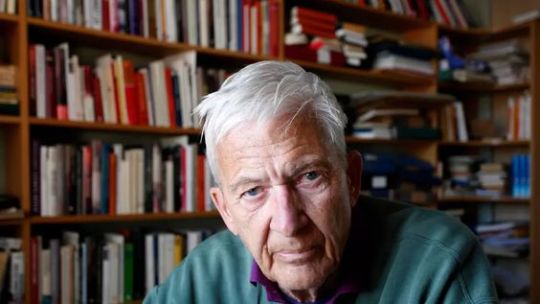#Magnetisörens femte vinter
Photo

P.O. Enquist, 1934 - 2020
#P.O. Enquist#Enquist#1934#1930's#2020#2020's#Per Olov Enquist#PO Enquist#P O Enquist#P. O Enquist#Kapten Nemos bibliotek#Magnetisörens femte vinter#Livläkarens besök#Lewis resa#Nedstörtad ängel#Legionärerna#Hjoggböle#Västerbotten#Sweden#Sverige#Svensk#Swede#Swedish#Lewi's Journey#The night of the tribades#Tribadernas natt#Liknelseboken#Captain Nemo's library#The Visit of the Royal Physician#The Royal Physician's Visit
19 notes
·
View notes
Photo

Acclaimed Swedish author Per Olov Enquist dies aged 85
Per Olov Enquist, one of Sweden's most acclaimed authors who wrote "The Visit of the Royal Physician," has died aged 85, his family told Swedish media on Sunday.
The patriarch of 20th century Scandinavian literature, Enquist is known for powerful stories that weave his own melancholic life into the dark side of history.
In his novels, plays and essays, he drew heavily on his own experience as an oppressed child in a strictly religious home, an athlete, a journalist and a destructive alcoholic.
Born in 1934 in Hjoggbole in Sweden's far north, his books -- including "The Crystal Eye" (1961), "The Parable Book" (2013), "The Magnetist's Fifth Winter" (1964) and "The March of the Musicians" (1978) -- have been translated into a dozen languages.
He won the 2001 August Prize, Swedish literature's top honour, for "The Visit of the Royal Physician", which earned him broad international fame and tells the story of a romance between the physician of the mad Danish King Christian VII and the queen.
Enquist, known in Sweden by his initials P.O., won a second August award with his impressive autobiography "A Different Life" (2008), its name an homage to "A Life" by August Strindberg, the father of modern Swedish literature.
"P.O. Enquist's importance for Swedish cultural life since the 1960s can't be exaggerated. He was the model for the socially-engaged poet who influenced generations of younger writers. It is empty and unthinkable that he is gone," wrote Bjorn Wiman, the culture editor of the Dagens Nyheter newspaper.
Bibliography
Kristallögat (1961)
Färdvägen (1963)
The magnetist's fifth winter (Magnetisörens femte vinter) (1964).
Bröderna Casey (1964)
Sextiotalskritik (1966)
Hess (1966)
Legionärerna: En roman om baltutlämningen (1968)
Sekonden (1971)
Katedralen i München och andra berättelser (1972).
Berättelser från de inställda upprorens tid (1974).
The night of the tribades (Tribadernas natt) (1975)
Chez Nous (1976).
The march of the musicians (Musikanternas uttåg) (1978).
Mannen på trottoaren (1979).
Till Fedra (1980). Based on the myth of Phaedra.
En triptyk (1981).
Rain snakes (Från regnormarnas liv) (1981)
Doktor Mabuses nya testamente (1982).
Strindberg. Ett liv (1984).
Downfall: a love story (Nedstörtad ängel) (1985).
Två reportage om idrott (1986). Earlier printed as Katedralen i München och andra berättelser.
Protagoras sats (1987).
The hour of the lynx (I lodjurets timma) (1988).
Captain Nemo's library (Kapten Nemos bibliotek) (1991).
Plays (Dramatik) (1991/2004). Contains The night of the tribades, Rain snakes, The hour of the lynx and The image makers.
Kartritarna (1992).
The Visit of the Royal Physician (Livläkarens besök) (1999).
Lewi's Journey (Lewis resa) (2001).
Boken om Blanche och Marie (2004). English translation as The Book about Blanche and Marie, 2006
Ett annat liv ("A different life", autobiography) (2008).
Liknelseboken: en kärlekshistoria (2013).
Daily inspiration. Discover more photos at http://justforbooks.tumblr.com
6 notes
·
View notes
Text
RIP Per Olov Enquist
Per Olov Enquist is dead at the age of 85, and since he was one of Sweden's few authors of international stature, with many of his books translated to English and German and many other languages, i guess i should talk about him in english some, especially since most of my online friends are not swedish.
He was IMO, the greatest living author writing in Swedish. Maybe the greatest ever, he is certainly more enjoyable than the traditional choice for that role, August Strindberg (whose misogynist views Enquist depicted critically in a play, the Night of the Tribades (and yes tribades as in lesbians))
He just wrote excellent books, in a beautiful stripped-down prose style. Many were based in history, like Livläkarens Besök, translated into english as The Visit of the Royal Physician, a late book that was his breakthrough outside of Sweden. It is about how Struensee, the doctor who treated the mentally ill king of Denmark Christian VII. in the late 1760s/early 1770s. Struensee used the king’s condition to basically rule Denmark and impose reforms in the spirit of the enlightenment.
Enquist’s book “Legionärerna” from 1968 is basically a history book, Enquist sticks rigidly to the facts, written in the style of a novel about how the Swedish government after WWII extradited soldiers from the Baltic states who fought for Nazi Germany to the Soviet Union, which was a massively controversial thing.
As a history book “Legionärerna” greatly impressed me both because of its attempt to present a nuanced view of the events, while also being aware of the impossibility of true objectivity. Enquist himself and his gathering of information about the extradition is part of the story, even the reasons for it, possibly to emphasize that it is written by a subjective human, not some impossible objective spirit. The book even outright tells the reader:
“Don't accept a story, think for yourself, be suspicious. There is no saintly objectivity, no ultimate truth, free from political bias. Examine, be suspicious. Question" (my translation)
His book Ett Annat Liv (another life, but it has been translated as “the Wandering Pine”) had a different factual basis: his own life and struggles with alcoholism. His life after becoming sober in 1990 was like another life for Enquist, and the reason for the swedish title.
He was often described as a pessimist, and i can see how his books can give that impression, there is a dark element to nearly everything i read from him.
Lots of failed reformers and revolutionaries, like Struensee (who spoilers /s was executed). One of his short story collections is actually called Berättelser från de Inställda upprorens tid (stories from the age of cancelled revolts). The story of the baltic soldiers can be read as the dark side of the Swedish social democratic project.
Or failure in general. In his book about himself, the story is about how his own success as a writer couldn’t keep him from becoming an alcoholic.
Another theme is how the darkness in the world leads people to comforting illusions, and a need for charlatans who provide them. His early book “Magnetisören’s femte vinter” (translated as the Magnetist’s fifth Winter) is about a german “magnetist” (an early form of hypnotism) based loosely on Franz Mesmer who becomes famed as someone who can cure diseases, including blindness. A story about the need for comforting illusions and the often unscrupulous people who provide them.
There is in general an interest in people who try to change the world on a large scale and who influence great numbers of people. Like Struensee. He also wrote a book about Lewi Pethrus called Lewis resa (translated as Lewi’s Journey) who was a major leader of the Swedish pentecostalist movement, maybe not a charlatan, but certainly a complicated figure.
But there is always hope in his books, something noble in even a failed attempt to better the world that can inspire those who come later. For Enquist, the legacy of people like Struensee would always live on.
And in the end, his memoirs is about how he managed to create another life from his failures. I have personally given away a copy of his memoirs to a family member with alcohol problems in the hope of helping them.
One of his books that illustrates this most starkly is Musikanternas uttåg (translated as the march of the musicians). It is probably my favourite of his books. It is a dark story about how the growth of the socialist movement in northern Sweden was hindered by widespread religiousness. The socialist agitator Elmblad in the novel is another failed reformer. The book also involves rape, a child being mutilated and suicide.
But the motto of the book is a hopeful one: Det gives alltid något bättre än döden. There is always something better than death, a quote from the fairy tale of the Town musicians of Bremen.
I carried that message with me. That book gave me a lot of needed catharsis in a dark time in my life.
And Enquist did not live a life of pessimistic quietism. He had an admirable and strong conviction that a writer could be, no, had the responsibility to be a moral-political force. His books are far from polemical, but he always saw a need to take a strong stand in the Swedish cultural and poltical debates.
He has admitted to his mistakes in doing that, but it was that conviction that was part of what made him a great author. In doing this he felt like a part of a literary tradition that includes people like Victor Hugo and Thomas Mann.
It’s hard to think of another author in Sweden who could still inspire such respect in so many, maybe there are none left in Europe.
An inspiring author in many ways, and his passing feels like the death of a literary titan, maybe the last of the titans.
3 notes
·
View notes